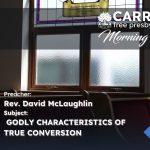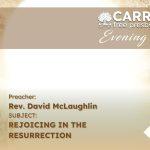Date: SUN 7:00 PM 25th May 2025
Preacher: Rev. David McLaughlin
Bible Reference: Titus 1:16
They profess that they know God; but in works they deny him, being abominable, and disobedient, and unto every good work reprobate.
Sermon Summary
The sermon, delivered from Titus 1:16, titled “Professor or Possessor, Which One Are You?” focuses on the distinction between genuine faith and false profession in Christianity. The preacher draws from the Apostle Paul’s letter to Titus, who was left in Crete to organize the church and appoint elders. The sermon emphasizes the spiritual dangers of professing faith in God without living a life that reflects true conversion, using biblical texts and anecdotes to illustrate the message.
Key Points and Themes
- Context of Titus 1:
- The sermon begins with an introduction to Titus, a pastor and convert of Paul, tasked with overseeing churches on the island of Crete. Paul’s instructions in Titus 1 emphasize appointing elders who are blameless, faithful, and capable of teaching sound doctrine to counter false teachers.
- The chosen text, Titus 1:16, states: “They profess that they know God, but in works they deny Him, being abominable, disobedient, and unto every good work reprobate.” This verse sets the tone for the sermon, highlighting the contrast between claiming to know God and living in a way that contradicts that claim.
- Central Theme: Professor vs. Possessor:
- The preacher introduces the concept of being a “professor” (one who claims to know God) versus a “possessor” (one who truly possesses saving faith). This is illustrated through the story of Jasper McGowan, a man from Ballymena who challenged a preacher’s teachings by emphasizing scriptural truth over academic credentials.
- The sermon argues that many profess faith in God but lack the transformed life that accompanies genuine conversion. True faith produces good works as evidence, not as the basis for salvation.
- Spiritual Sickness of False Professors:
- The preacher identifies a “spiritual sickness” in the church, both in the first century and today, where many claim to be Christians but live unchanged lives. They may recite John 3:16 or perform religious acts (e.g., signing a card, raising a hand, or saying a prayer), but their actions betray their profession.
- Biblical references like 2 Corinthians 5:17 (“If any man be in Christ, he is a new creature”) underscore that genuine conversion results in a transformed life marked by a hatred for sin, love for righteousness, and devotion to Christ.
- The sermon warns that false professors have a “phony peace” and false assurance, lacking the fruit of true faith, such as love for God’s Word, His people, and holiness.
- Jesus’ Teachings on Hypocrisy:
- The preacher cites Matthew 7:4–5, where Jesus addresses hypocrisy, and Matthew 7:15–20, where He warns of false prophets who appear as sheep but are wolves inwardly. The analogy of good and bad trees emphasizes that true believers produce good fruit, while false professors produce “thorns and thistles.”
- Matthew 7:21–23 is pivotal, where Jesus declares that not all who call Him “Lord” will enter heaven, but only those who do the Father’s will. On judgment day, many will claim to have done great works in His name, only to hear, “I never knew you; depart from me, ye that work iniquity.”
- This warning applies to the “tens of thousands” of professing Christians who risk eternal judgment due to their lack of genuine faith, including those in evangelical churches.
- Characteristics of False Professors:
- Abominable: False professors are detestable because they are prideful, thinking highly of themselves while ignoring their sinfulness.
- Disobedient: They stray from God’s commands, likened to goats that resist the shepherd’s guidance, unlike sheep who follow willingly.
- Reprobate: They are “unqualified” or unfit for God’s presence, as their works do not align with their profession. The preacher uses the analogy of a builder rejecting flawed stones to illustrate this disqualification.
- Examples of False Profession:
- The sermon references biblical figures like Cain, Balaam, Orpah, Judas Iscariot, and Simon Magus, as well as parables (e.g., the wheat and tares, the ten virgins) to show the prevalence of false profession.
- Modern examples include “dodgy” business practices (e.g., shortchanging customers) by those who profess Christ, which undermines their witness and leads others to reject Christianity.
- Superstition, such as reliance on rituals, statues, or symbols (e.g., crossing oneself, baptizing infants for salvation), is condemned as powerless compared to true faith in Christ’s blood.
- Call to Self-Examination:
- The preacher urges the congregation to examine their hearts, referencing 2 Corinthians 13:5 (“Examine yourselves, whether ye be in the faith”) and other scriptures (e.g., Romans 14:11, Hebrews 4:13) that emphasize accountability before God.
- A personal anecdote about a woman’s dream of being dragged to hell despite professing salvation highlights the danger of pride and the need for repentance.
- The sermon closes with a challenge to reject pride, repent of sin, and seek true communion with God, ensuring one’s life aligns with their profession of faith.
Conclusion
The sermon is a sobering call to distinguish between mere profession of faith and true possession of salvation. It warns against the spiritual sickness of hypocrisy, using Titus 1:16 to highlight the disconnect between words and works in false professors. Through scripture, anecdotes, and practical examples, the preacher emphasizes that genuine faith produces visible fruit, and all will one day stand before God to give an account. The congregation is urged to search their hearts, repent, and live in true fellowship with Christ to ensure they are possessors, not just professors, of faith.
Subscribe to the podcast here:
Spotify Podcasts | Apple Podcasts | Pocket Casts
Email | RSS | more information here








